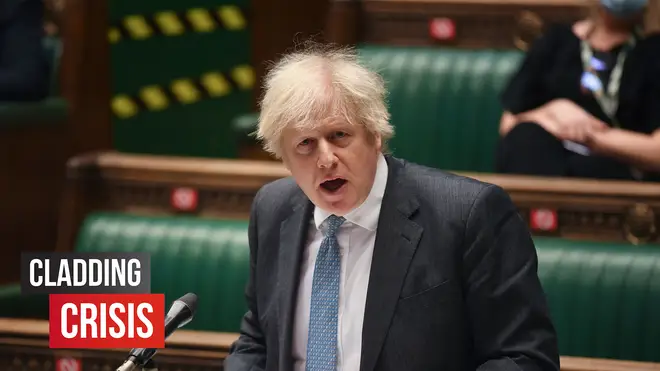
Oli Dugmore 4am - 7am
10 February 2021, 19:42 | Updated: 10 February 2021, 19:44

Boris Johnson’s backbenchers are growing increasingly rebellious.
In recent weeks, they’ve voiced concerns about reported Treasury plans to end the £20 a week Universal Credit uplift.
They’ve been up in arms about the government’s refusal to accept a plan to give the courts the power to stop the UK signing trade deals with countries committing genocide.
And they’ve been demanding that ministers do more to help people living in buildings with unsafe cladding.
Read more: Leaseholders in high-rise flats to face 'no extra costs' to remove dangerous cladding
The last of these issues is not new. It is more than three-and-a-half years since the Grenfell Tower disaster first alerted the political class to the fact that millions of people were living in buildings that were effectively tinder boxes.
Yet several years on, only a fraction of the cladding panels that need removing have actually been removed. As LBC has repeatedly reported, up to an estimated 11 million people are still living in homes that they are unable to sell because of the crisis.
Ministers have faced continual pressure to do more to facilitate the removal of the dangerous cladding, particularly the most flammable type, called Aluminium Composite Material (ACM).

Housing Secretary pledges help for high-rise cladding leaseholders
Their initial package, announced in May 2018, provided £400m for removing ACM from social housing blocks.
It was more than a year later that more money – an additional £200m - was made available, this time for removing ACM from privately-owned blocks.
But the estimated cost of removing dangerous materials from the 12,000 high-rise residential buildings in England is thought to be around £15bn.
As of today, only £5bn has been offered.
And then there is the matter of what help will be offered to people living in blocks lower than 18 metres in height, those in buildings that are unsafe because of non-ACM cladding, and those who have to deal with other fire safety issues that are not caused by cladding at all.
In total, the cost of removing dangerous materials and making buildings safe could exceed £30bn.
With many private developers continuing to drag their feet on the removal of dangerous cladding, it had become clear that the government would have to do more.

Tory MP blasts "incompetent" Housing Secretary over cladding crisis
Dozens of Tory backbenchers are among those who have been urging ministers to do so. 39 of them have signed an amendment to the Fire Safety Bill that would stop building owners passing the cost of remedial work onto tenants and leaseholders – almost enough potential rebels to inflict a defeat on the government if it sought to strike down the amendment. That is due to be voted on in the coming weeks.
The issue of unsafe cladding affects people in virtually every constituency in the country.
MPs across the land are hearing representations from constituents who go to sleep in their homes fearing for their safety, and in many cases who are trapped there – unable to sell what is known to be an unsafe property.
There is not just a moral imperative to act but, for ministers, a political one too. As the Covid crisis begins to ease, Boris Johnson is determined to refocus on his “levelling up” agenda that aims to improve the lives of people who are “left behind”.
There is hardly a better example of that than those trapped living in what is mostly poor-quality housing that is now known to also be unsafe, and whom in many cases are being denied the ability to leave, even if they have the means to do so.
The government’s latest attempt to address this was delivered by Robert Jenrick in the House of Commons on Wednesday.

How does the Australian Cladding Taskforce work?
The Housing and Communities Secretary announced a further £3.5bn in funding for people in high-rise blocks and a loan scheme, never exceeding £50 a month, for those in lower-rise blocks.
Amid concern from MPs that this would amount to a taxpayer-funded subsidy for wealthy proper developers, he pledged that the money would be recouped in future through a new levy on developers of high-rise blocks, and a separate new tax on residential property development from next year.
The package was welcomed as a step in the right direction, but is it enough? Campaigners say it falls well short of the funding required and will continue to leave many people trapped in unsafe blocks.
And to say that some Conservative MPs were unhappy would be understating it. Stephen McPartland, the Tory MP for Stevenage, told LBC shortly after Jenrick’s statement: “I was listening to it with my head in my hands. I just cannot believe he’s gotten it so wrong.
"It’s clear he doesn’t understand what’s happening - they don’t have a grip of the issue. It’s incompetence and think it’s time the Prime Minister stepped in now.”
The Housing Secretary’s announcement is the latest attempt to resolve an issue that has dogged ministers for years, but few believe it will be enough to solve it.
Finding a long-term solution to the cladding scandal will inevitably require yet more focus – and funding – from government.
Mr Jenrick told the Commons: “This will take time. There is more to be done.” It’s a sentiment that many of his own backbenchers will not hesitate to remind him of in the months to come.